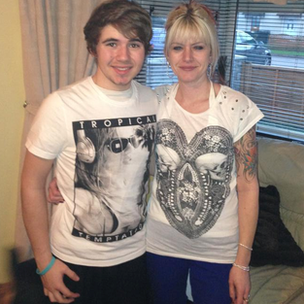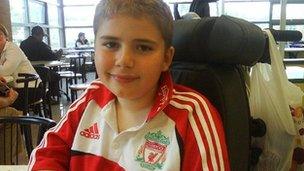'My child's massive stroke, aged 11'
- Published

Kray, 15, and his mum Soniya have had a long road to recovery
Soniya Mundy remembers screaming at the ambulance crew who answered her 999 call one night after she found her son, Kray, lying on the floor of his bedroom unable to move.
"I knew he'd had a stroke. He looked just like my gran. I watched her have a stroke in her 80s.
"His left arm was all curled up, his forehead was swollen and he was saying he couldn't see. He couldn't feel any of the left side of his body.
"But they said it couldn't be a stroke 'because he's a kid'."
When 11-year-old Kray got to hospital in Bristol he had a CT scan which revealed he had suffered a massive stroke.
Kray is one of approximately 350 children in the UK who have a stroke each year - just a fraction of the 150,000 adults who are affected in the same period.
However, unlike adults, where the greatest risks of stroke are known to be smoking, diet and high cholesterol, the causes of childhood strokes are less clear-cut.
Research by scientists at Bristol University shows that heart disease, infections and malformed blood vessels could all increase the chances of stroke in children, but in about 17% of cases no cause is found.
'He's gone'
Doctors discovered that Kray had an abnormal cluster of blood vessels and arteries in the brain, called an arterial venous malformation, which had triggered the stroke.
Even after four hours in surgery to drain the blood and relieve the pressure on his brain his condition continued to deteriorate. The only option was brain surgery to remove the blood clot and the malformation followed by an induced coma.
Several times, during those dark hours, his family thought they had lost him.
"He was playing football in the field by the house the night before. Then suddenly I was standing by his bed thinking 'This is it - he's gone'," Soniya says.
Nine days after his stroke, Kray began his long road to recovery.
"We didn't know how much brain damage he had. They said he might never walk again. His speech was slurred and he had no feeling in his left hand or arm."
Yet, thanks to intense physiotherapy and speech therapy and Kray's own determination to recover, Soniya watched him walk out of hospital just eight weeks later.
But that really was only the start of his return to normal life.
'Horrific'
When Kray went back to school in September, just three months after the stroke, he was very weak. Even the easiest tasks were a huge challenge for him.

Kray received intensive physiotherapy to help him recover from his stroke
Soniya says it was a "horrific" time which led to her having a breakdown that December, but she fought to continue Kray's therapy and has become such an expert in his recovery that she considers herself her son's personal therapist now.
Kray is nearly 16 now, he is going to college this year and wants to become an aerospace engineer because he loves physics. He has come a long way, but he still faces daily struggles having a dominant right side and a weaker left side.
"I have come to terms with it. It's pointless being down about it, I've just got to get used to it now," he says frankly.
"Sometimes I feel like it might happen again, but I've just learnt how to get round things."
He can use his smartphone one-handed and he can type one-handed. He's even learning how to play the guitar.
Quick diagnosis
Sophie Scott, professor of cognitive neuroscience at University College London says children's brains are better able to cope with recovery after a stroke.
"If you have an injury to your brain when younger you're more likely to make a good recovery. The brain is still developing up until the age of 20.
"Damage which occurs can be much better adapted to than the adult brain."
Dr Andrew Mallick, a research associate at Bristol University, who has just completed a large study into strokes in children in the south of England, says the key to recovery is diagnosing strokes quickly.
"There is a need to treat people rapidly. We found that the time to diagnosis was much longer in children than in adults. Children are often initially given other diagnoses."
Soniya was so desperate to talk to other families with children in the same position as Kray that she set up her own support group website, external. It has proved to be a major help to both of them over the past few years, as has the Different Strokes, external charity.
"I've recently realised I can loosen the reins and let him go out more with his friends and do other things.
"I've met so many families who've lost their children to strokes that it gives me strength to say to him 'Come on let's get on with it'."
- Published10 January 2013
- Published27 December 2012
- Published12 February 2011